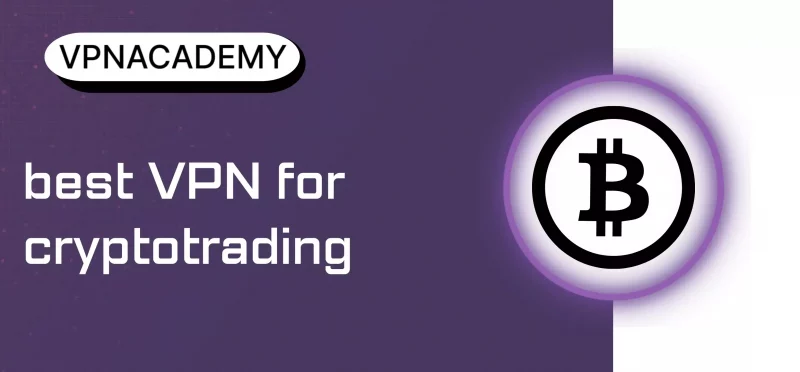Cryptocurrency trading is becoming increasingly popular as a way to make money, and it’s no surprise why. With the rise of digital currencies like Bitcoin, Ethereum, and Litecoin, traders can make large returns on their investments. However, it is important to remember that cryptocurrency trading comes with its own set of risks. To ensure your security while trading cryptocurrency, it is essential to use a reliable crypto VPN. Here are the top three VPNs for crypto trading in 2025.

ZoogVPN – Best VPN for Accessing Exchanges Seamlessly and Securely
- Built-in protection against ads and DNS leaks
- Simple setup and user-friendly apps for all devices
- Strict zero-logs policy
- Ability to use the VPN for Binance for free
- Servers in 55+ locations, including crypto-friendly countries

Surfshark – For Teams: Unlimited Devices
- Connect an unlimited number of devices with one subscription
- Strong AES-256 encryption and a reliable kill switch
- Fast connection speeds for real-time trading
- Access crypto exchanges blocked in certain countries
- Excellent value for money

PureVPN – Data Protection and High-Speed Connections
- Fast and stable connections for smooth crypto trading
- Servers in 65+ countries, including key crypto and trading regions
- User-friendly interface and quick setup
- Up to 10 simultaneous connections under one account
- Powered by the secure WireGuard protocol
Why Every Crypto Trader Needs a VPN
Cryptocurrency transactions, by nature, are irreversible. Once a transfer is made, it can’t be undone. That’s why security is crucial. When you log in to an exchange, check your balances, or move funds between wallets, your data travels through multiple networks. If even one of those connections is compromised, say, on public Wi-Fi, an attacker can intercept your credentials or wallet seed phrases.
A VPN encrypts that data, making it unreadable to outsiders. Even if someone manages to intercept the traffic, the encryption ensures it remains useless gibberish.
Other key reasons traders use VPNs include:
- Protection from phishing and man-in-the-middle attacks
- Avoiding geo-blocks and regional exchange restrictions
- Preventing ISP-level tracking or throttling during high activity
- Ensuring anonymity when moving or converting funds
For traders operating across borders or using exchanges unavailable in their country, a VPN can even unlock platforms otherwise inaccessible due to local regulations.
How a VPN Strengthens Security in Crypto Trading
VPNs do more than hide your IP address. They build an encrypted tunnel between your device and the VPN server, shielding all your online traffic from view. This includes DNS requests, transaction data, and even which exchanges you visit.
The most secure VPNs, such as ZoogVPN, Surfshark, and PureVPN, use AES-256-bit encryption, which is the same standard used by banks and government agencies. This ensures every data packet remains protected, even against advanced decryption attempts.
Additionally, these providers implement safeguards like:
- DNS and IP leak protection – preventing your true IP or location from being exposed
- Kill switch – instantly disconnecting your internet if the VPN connection drops
- Strict no-logs policies – ensuring your activity isn’t recorded or stored
- Malware and phishing protection – blocking malicious websites commonly used in crypto scams
These layers of defense are especially valuable in an environment where phishing campaigns and fake exchange sites are rampant.
Is Using a VPN for Crypto Legal?
Yes, in most countries, using a VPN for crypto trading is completely legal. VPNs are privacy tools, not mechanisms for breaking the law. Traders use them to secure financial communications, just as businesses use them to protect corporate data.
However, it’s important to understand your local regulations. Some countries, such as China, Russia, or certain Middle Eastern regions, have strict rules about VPN usage and cryptocurrency activity. In these areas, using a VPN is still possible but must be done carefully and responsibly.
Providers like ZoogVPN offer specialized protocols such as Shadow, which combines VPN and proxy technologies to bypass censorship and keep users connected even in restrictive environments. This makes it a trusted option for traders who operate internationally or reside in regions with internet control policies.
Can Police Track a VPN?
This is one of the most common concerns among crypto traders. The short answer: a properly configured VPN with strong encryption and a no-logs policy is extremely difficult to trace.
Law enforcement cannot directly monitor encrypted VPN traffic, all they see is that a user is connected to a VPN server. Without logs or user data, even a court order can’t reveal your browsing history or crypto activities.
That said, not all VPNs are equally private. Free or unverified VPNs often log data or cooperate with third parties, which defeats the purpose of using them. This is why it’s critical to stick with reputable, independently audited providers like ZoogVPN, Surfshark, or PureVPN, all of which maintain strict no-logs commitments and use secure data centers in privacy-friendly jurisdictions.
Can a VPN Protect You from Crypto Hackers?
A VPN is not a magic shield that stops all attacks but it is one of the most powerful preventive tools against crypto-related hacking. By encrypting your traffic, masking your real location, and securing your device’s connection, it effectively prevents attackers from:
- Stealing exchange login credentials over public Wi-Fi
- Tracking transactions back to your IP address
- Injecting malicious redirects into your browsing session
Moreover, services like Surfshark and PureVPN include built-in protection features such as malware filtering, ad-blocking, and phishing detection, which can neutralize common threats used by crypto scammers.
For traders using DeFi apps or browser-based wallets, this extra protection is invaluable in preventing cross-site tracking and malicious scripts that could steal keys or tokens.
Paying for VPNs with Cryptocurrency
Privacy-conscious users often prefer to pay for their VPN subscriptions using crypto rather than traditional payment methods. This approach helps ensure anonymity from the very beginning – no credit card numbers, no billing addresses, no banking trails.
Both ZoogVPN, Surfshark, and PureVPN accept cryptocurrencies as payment. Whether you’re paying with Bitcoin, Ethereum, or another coin, the transaction remains confidential, with no personally identifiable information attached to your VPN account.
For users seeking complete digital privacy, this is an important feature to consider, especially when pairing crypto usage with a service designed to protect that very activity.
Should You Use a Free VPN for Crypto?
The short answer: no. While free VPNs may seem convenient, they usually come with severe trade-offs. Many log user data, display intrusive ads, or even sell browsing information to third parties. Others lack robust encryption and leak DNS or IP data, exposing your identity to exchanges and potential attackers.
In crypto trading, financial stakes are high, so using an unreliable or free VPN can be even more dangerous than not using one at all. Paid VPNs like ZoogVPN, Surfshark, and PureVPN offer secure, high-speed servers, verified privacy policies, and consistent performance, all crucial for real-time trading and transaction safety.

